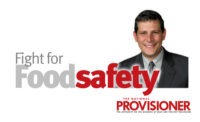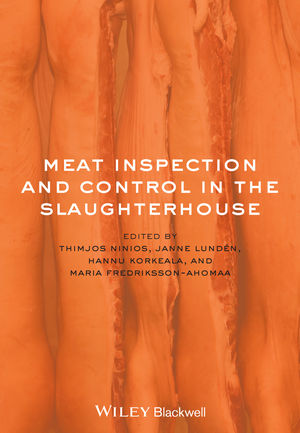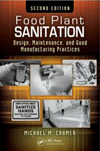
By Larry Wallace, Guelph Food Technology Centre
The ripple effect of September 11, 2001, has shifted the way business is conducted worldwide. The food industry has been no exception.
Before 9/11, food safety was the main focus for food companies. Biosecurity was not a term bandied about in boardrooms and on factory floors. “Security” for food business meant protecting plants from fire, vandals or industrial espionage and patrolling the plant to check for dangers such as ammonia leaks. Only the most progressive companies completed risk assessments and integrated security with food safety.
In a post-9/11 world, with its increased risks of bioterrorism and product tampering, food defense the protection of the food in the supply chain from farm to fork has undoubtedly been the cause of sleepless nights for CEOs and food-industry leaders. It has become a specialized discipline that requires knowledge of traditional food-safety matters, such as good manufacturing practices, plus in-depth knowledge of risk management, security, investigations and auditing.
Assessing risks
Acts of deliberate food contamination have been reportedly been occurring in the United States since 1984. There has been a very limited amount of product tampering, but the number has been increasing slowly. Product tampering using a risk matrix is very low as far as incidents, but very high as to the consequences.
Breeches to food defense cost the country millions to billions of dollars in health-care expenses, lost wages, decrease in consumer confidence and trade embargoes. The Centers for Disease Control (CDC) reports there are three types of economic effects that may be generated by an act of food terrorism:
- Direct economic losses attributable to the costs of responding to the act;
- Indirect multiplier effects from compensation paid to affected producers and the losses suffered by affiliated industries, such as suppliers, transporters, distributors, and restaurant chains;
- International costs in the form of trade embargoes imposed by trading partners.
Despite the high cost of bioterrorism, tampering and deliberate contamination, the way food products are displayed at the retail level sometimes without secure packaging imposes many challenges upon food defense.
At the plant level, food-safety personnel are usually looking for known contaminants. They are not necessarily watching for contaminants not normally found in their products.
Regulatory compliance
In 2002, the Bio-terrorism Act was implemented in the United States. It requires all companies selling food products in the U.S. to secure their facilities against bioterrorism. In addition, all facilities either manufacturing in the U.S. or exporting into the U.S. are required to register their facilities with the FDA.
Additionally, the Customs and Trade Partnership against Terrorism (C-TPAT) was initiated by U.S. Homeland Security to expedite cross-border shipping. It is a voluntary program, but now most progressive businesses have made it a requirement for their suppliers to become an active partner in it, or at the very least to meet all the requirements of C-TPAT. This program focuses on the overall security of the supply chain and requires partners to implement security elements along their supply chain based on risk.
All C-TPAT partners must have security elements in place to deal with the following:
- Employee positive identification (photo ID)
- Visitor control
- Deliveries including mail and mail-handling procedures
- Challenging and removing unauthorized persons
- Hiring procedures including background checks on new employees
- Procedural security (includes document security, IT security, etc.)
- Shipping and receiving security procedures
- Security training and awareness for all employees
- Physical security (guards as needed, fences, gates locks, etc.)
- Access control electronic or procedural
- Lighting
- Closed-circuit television (CCTV)
- Alarms
As a result of these risks and regulations, most major retailers, foodservice companies and restaurant chains have added food defense or security as a requirement to suppliers with which they do business.
Lingering challenges
Many ongoing food-defense weaknesses are related to lack of trained personnel. Most companies don’t have a security expert either on staff or on retainer to guide them through all the pitfalls of establishing and maintaining an effective security and food-defense program.
Some companies that supply security products or services often call their sales staff “security consultants,” but they can be biased toward selling their own products, as opposed to what the client may need.
Security professionals who understand the food industry and its needs are scarce, as are food-safety professionals who have any experience with security, investigations or the legislation requirements pertaining to security
The other main weakness tends to exist in food-defense processes. Many companies tend to add security elements based on customer audits without doing a thorough risk assessment of their needs.
At the level of investigations, food-safety professionals who detect and investigate foreign material have little or no experience in collecting and preserving evidence. They normally treat all findings of foreign material as accidental and only look at product tampering when they run into a dead end. In fact, it should be the opposite: Every case of foreign material detection should be treated as product tampering until tampering has been ruled out.
Another food-tampering challenge is not the actual tampering, but the threat by terrorist groups who might claim that they have tampered with the product.
To overcome these problems, companies should have a risk-based food-defense and security program that includes the training of all employees on the importance of security and food defense. Furthermore, this program should be audited by a qualified person on an annual basis to ensure that it is still effective and appropriate for the associated risks.
Larry R. Wallace CRM, CPP delivers workshops on food defense throughout North America and serves as the senior food defense specialist for the Guelph Food Technology Centre (www.gftc.ca), a company that offers training, food safety and quality auditing and consulting as well as technical expertise to the food and beverage industry worldwide.








